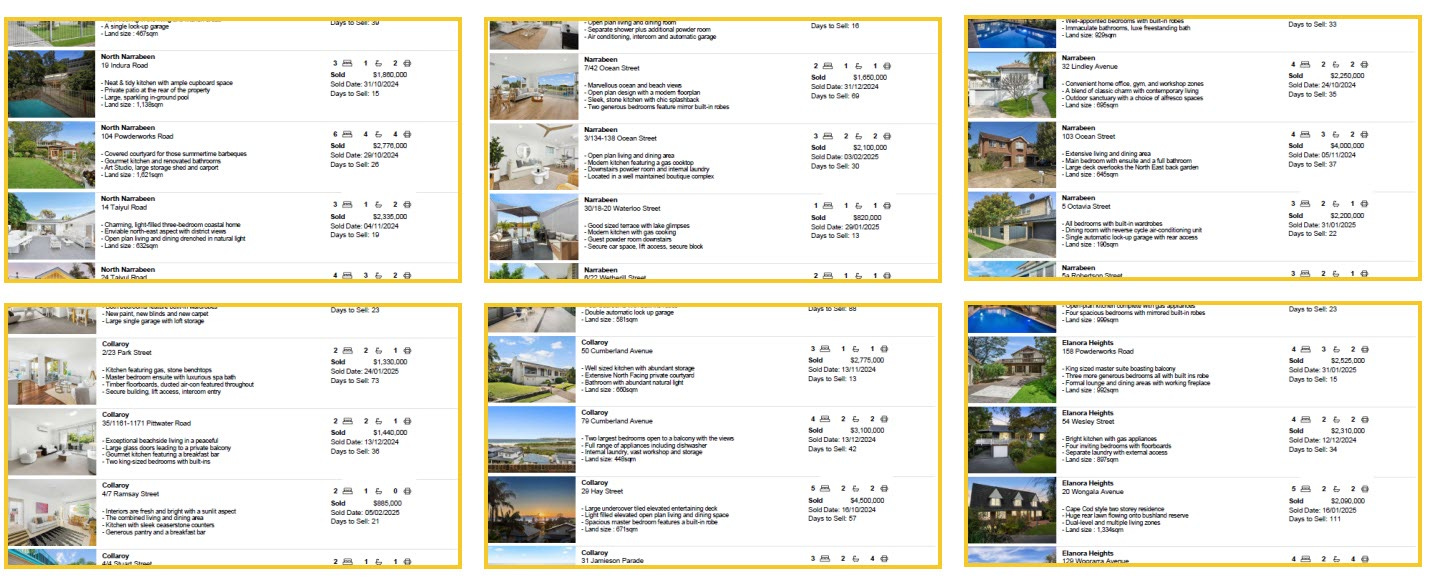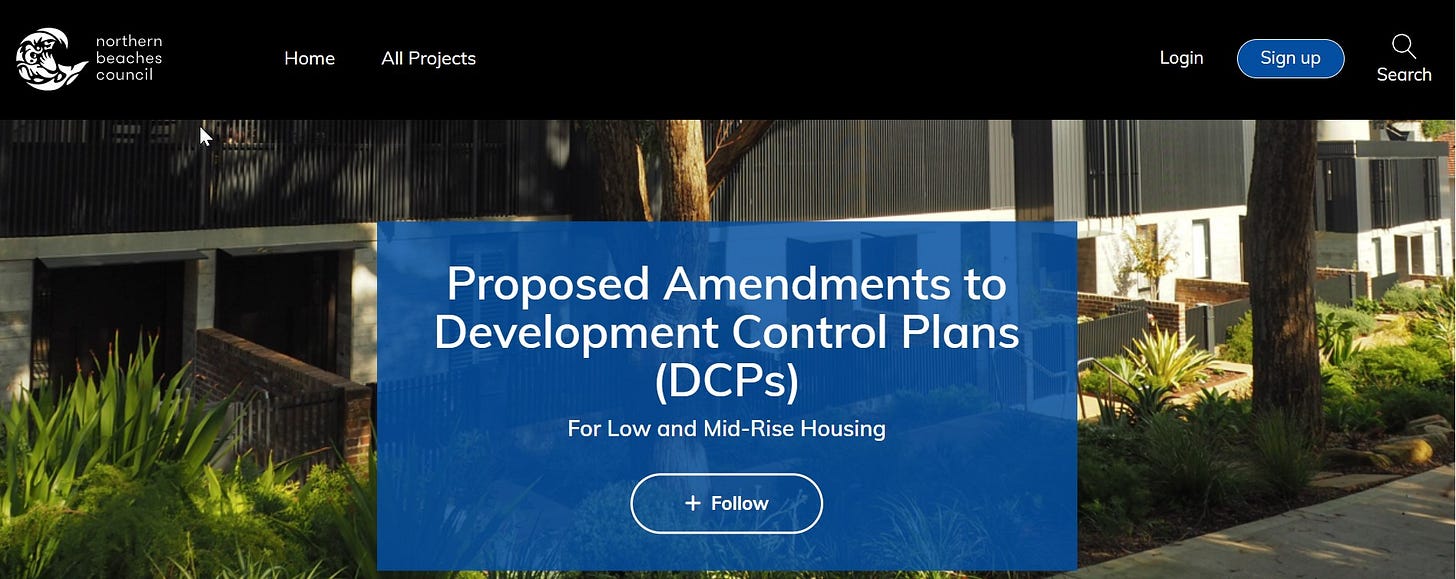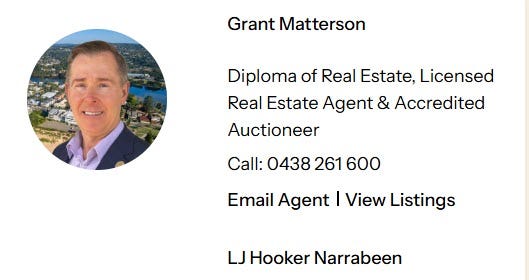A Guide to Selling a Rental Property With Tenants
Grant Matterson LJ Hooker Narrabeen
In today’s post you will find-
Let’s take a look at the latest recent sales in the area
Development Control Plans Amendment - Low and mid-rise housing
A Guide to Selling a Rental Property With Tenants
Let’s take a look at the latest recent sales in the area
Recent Local Sales dated 30/05/2025
Click on the Links to View Local Recent Sales
Click here for FREE Market Estimate of Value on your Home or (Simply send me a text to 0438 261 600 with your detials)
Development Control Plans Amendment - Low and mid-rise housing
What's happening?
The NSW Government's recent ‘Low and Mid-Rise Housing Reforms’ under State Environmental Planning Policy (Housing) 2021, override established planning rules in our Local Environmental Plans (LEPs), allowing much larger developments in some areas.
Stage 1 started on 1 July 2024, permitting dual occupancies and semi-detached dwellings in all R2 low density residential zones.
Stage 2 started on 28 February 2025, allowing townhouses, terraces and small apartment buildings (up to 9.5 metres high) in R1 and R2 zones within 800 metres of nine identified town centres on the Northern Beaches. It also permits apartment buildings up to 6 storeys (22-24 metres) in R3 medium density residential zones within 400 metres of these centres, and up to 4 storeys (17.5 metres) within 400-800 metres.
The 9 identified town centres on the Northern Beaches are:
FOR MORE INFORMATION CLICK HERE
A Guide To Selling a House With a Mortgage
Selling a rental property with tenants can feel overwhelming, but it doesn’t have to be. With the right approach, you can protect your interests, maintain a positive relationship with your tenants, and ensure a smooth transition for the new buyer.
This helpful guide will walk you through the key steps, legal considerations, and smart strategies to make the process as straightforward and stress-free as possible.
Can you sell a property with tenants?
Yes it is absolutely possible! Selling an investment property with tenants often makes financial sense for investors. After all, it is not always possible to time going to market at the same time a lease is ending.
Selling a tenanted investment property lets you maintain consistent rental income right up until settlement. This can make a big difference to your financial stability, especially if you need to make home loan repayments.
Additionally, other investors often prefer to purchase a property that has reliable tenants and, in some cases, this can help push the sale over the line.
However, having tenants in your property does add a level of complication when putting the property on the market. In many cases, tenants facing the sale of their ‘home’ are likely to be very unhappy. If the property is not purchased by another investor, it may mean having to move into a new place which is both time-consuming and costly.
This also means incurring unexpected expenses for removalists, cleaners, utility connections and putting up bond money for their next rental. So, there are a lot of reasons why they may be understandably dissatisfied about the upcoming sale of your property.
So, the big question is, can you keep tenants happy and sell your property at the same time? The answer can be a ‘yes’ if you are respectful and considerate of their circumstances and follow some simple guidelines.
How to sell a tenanted property
1. Communicate openly with your tenants
Open and early communication is key. You must let your tenants know you are going to sell the property BEFORE you put the property on the market.
Many tenants love their 'home' and in many cases, if they are in a financial position to do so, may like to buy your property. So, have your property manager contact the tenants directly and offer them the opportunity to purchase it.
Keep in mind if the first time they hear about the sale is when the signboard is going up, you’ll find they may be less cooperative to work with you to help you sell your property – and you need them on your side.
Additionally, in many states and territories, you need to abide by legislative requirements and notice periods and be reasonable about the number of inspections that are held each week.
In some states such as NSW, if you don’t let your tenants know that you are planning on selling your property when they sign the lease, and you go on to sell, they have the right to give notice to vacate the property whether they are on a lease or not. Make sure you talk to your property manager about your specific state and territory legislation.
2. Host open homes and inspections
If the property has tenants, you have less control over how well the property will be presented to potential buyers.
Most tenants will do the right thing and ensure the property is tidy and in a reasonable state for inspections; however, poor presentation such as visible clutter, an unmade bed or overflowing garbage can have a negative impression on buyers. If the property is presented very poorly, this can directly affect the sales price.
Again, open communication is key here. In most states and territories, written notice must be provided to the tenants at least 24 hours before the property will be shown to a potential buyer.
To help ease tension over last-minute requests, it is a good idea to organise two set times per week for open home viewings. This gives your tenants enough notice to tidy up the property and make plans to be out of the premises.
Be sure to check that the time is convenient for them. There is no point planning an open home for 10am if your tenant is just coming off an overnight shift. Ask your property manager to put all details of open inspections in writing and to check that it has been read and understood by your tenant.
While there is no official requirement for tenants to be out of the property, by keeping them informed they are often happy to go out for the duration of the inspections.
3. Offer incentives to your tenants
Another idea to keep tenants happy is to provide them with some incentives to keep the property inspection-ready. This may provide some relief for any inconvenience during the marketing campaign. Here are a few smart tips for you:
Taking $50-$100 off the weekly rent in return for the tenants presenting the property as nicely as possible for viewings and staying away during open homes
Consider offering a week’s free rent when the property sells to help them pay for the relocation costs
A modest compensation for preparation and cooperation during the inspection.
Organise a cleaner on the morning or day before the inspection (who doesn’t love coming home to a tidy home!)
Arrange for your property manager to leave the tenants a small thank-you gift such as a box of chocolates or movie tickets after an open inspection
Offer to provide a reference for their future rental property applications
4. Give the tenants the option to break the lease
If your tenants are unhappy, offering them an early release from their rental agreement may be a better option. While you will miss out on the income during the sales process, having them out of the property offers benefits too.
It will allow you to access the property and fix anything that needs to be repaired – these may be things you couldn’t undertake easily with a tenant living there. Do the walls need a repaint, how is the carpet looking, does the bathroom or kitchen need a refresh?
These changes can often bring in more money when you sell than if you had the tenant in place collecting rent. Plus, you don’t have to worry about the property not being in excellent condition for open inspections.
A few points to consider though – if your tenant is on a fixed-term lease you cannot ask them to leave unless they choose to break the lease themselves. If you can’t wait until the end of the lease to sell, then your property manager can try to negotiate with them and perhaps offer an incentive for them to break the lease.
If your tenant is still living in your property past the end date of your fixed-term lease, they are protected under what is called a Continuing Agreement Tenancy. You can terminate this lease if you give them 90 days notice, or advise them that you plan on selling the property and give them 30 days notice when the sales contract is signed. Of course, you need to make sure the tenants are out of the property before the settlement date.
5. Pay for professional cleaning support
A well-presented property has a direct impact on how many people are interested in your property, how quickly it sells and how much it fetches. Relying on your tenants to prepare your property for sale is a bad idea.
Hire a cleaner (and gardener if you have an outside space) to do a thorough clean and yard tidy-up before you take any photos or open the property for inspections.
First impressions matter, so spending some money on making your property look its best can really pay off, plus the cost of this is tax deductible and your tenants will be happier living in a fresh, clean and tidy home.
6. Property styling and presentation
The housing market is competitive, so it’s vital to do everything you can to make your property stand out. One of the things that can help is property styling. This allows potential buyers to better envision themselves living in the home. Of course, this will be difficult while your current tenants are still living there.
This doesn’t mean you have to abandon the idea of any staging altogether as it is an important strategy to entice buyers to come in for an inspection and make an offer. Instead, look for quick and easy ways to stage that won’t impact your tenant’s life. For instance, focus on the garden and enhancing the home’s curb appeal such as tidying the exterior and new landscaping.
7. Get professional help
A professional real estate agent or your dedicated property manager can help you when selling a rented property. They can provide you with a guide to selling a tenanted house or property and the steps to take to ensure you comply with any local and federal laws.
Our agents know the market and the legalities around tenancy agreements and can guide you to achieving the best sale outcome for your property while navigating the complexities of selling property with tenants.
Tenant and landlord rights during the sale of property
Landlords/agents have the right to access the property to show it to prospective buyers. However, they must give the tenant a written notice at least 14 days beforehand.
Tenants are within their right to request a rent reduction during the period that the property is being shown and prepared to sell. However, there is no requirement for the landlord to agree.
Tenants have the right to remain at the premises while the property is being shown.
Landlords/agents can take photos/videos of the property to market it for sale. However, they can only do this once in the 28 days before marketing starts or the agreement ends. The landlord/agent must also give reasonable notice of the access and give the tenant a reasonable opportunity to move their possessions.
Landlords must obtain the tenant/s consent to put a ‘for sale’ sign on the premises if the property is a house. However, if the property is in a strata scheme, the landlord/agent can put a for-sale sign or hold an auction on the common property without tenant consent.
If the rented property for sale is a house, the landlord/agent cannot hold an auction on-site without the tenant/s consent.
What happens after your rental property sells
If the landlord doesn’t terminate the lease agreement, the tenant should be given a written notice that states the buyer’s name and address and includes directions for the tenant on how to make future rental payments to the new buyer.
If the tenant's agreement is up and they are moving out, it’s a good idea for landlords to remain considerate and courteous and to part ways on a positive note. Be aware that an unhappy tenant could affect the sale price for an owner, so it’s always crucial to build a good relationship with your tenants throughout the entire sale process.
Click here for FREE Market Estimate of Value on your Home or (Simply send me a text to 0438 261 600 with your detials)











please do not put "home" in quotation marks. these *are* peoples' homes. tenants pay landlords' bills and landlords should treat them with due respect, courtesy, and humanity
value your tenants. know that they are people working hard to live. do not exploit them.